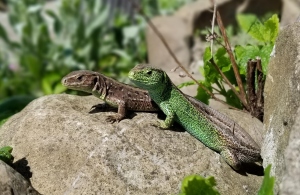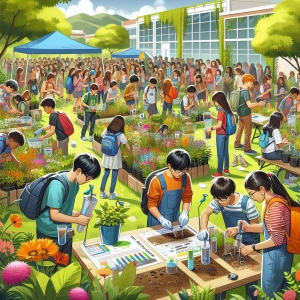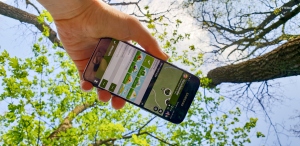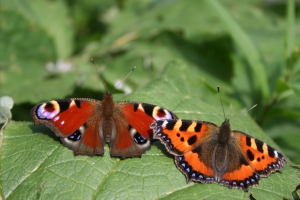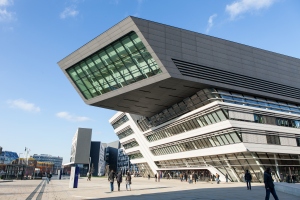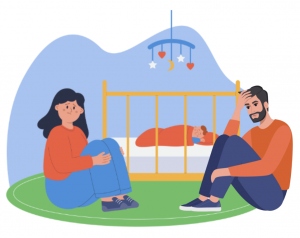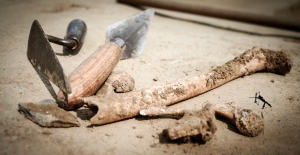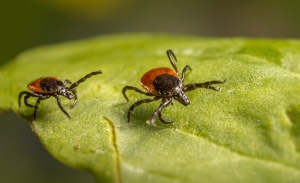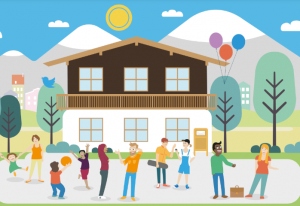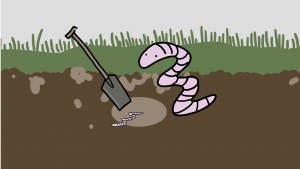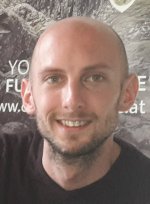
Florian Heigl
BIOM-Garten
Monitoring of Amphibians and Reptiles in Austrian Gardens
The BIOM-Garten project invites people of all ages to look out for amphibians and reptiles in their gardens and report their observations. This will help to fill gaps in existing monitoring and implement better conservation measures for these endangered animals.
What are the aims of the project?
Amphibians and reptiles are among the most endangered animals in the world. In Austria, more than half of the 21 amphibian and 15 reptile species are classified as endangered, critically endangered or already threatened with extinction. The aim of the project is to fill the gaps in the existing monitoring of amphibians and reptiles with the help of citizens and to shed more light on private gardens as habitats for endangered species. In addition, citizens can describe their gardens to characterise environmental parameters, and remote sensing methods will be used to complement species monitoring. This is the first time that the contribution of gardens to habitat connectivity is analysed specifically for aquatic and semi-aquatic animal groups. The garden descriptions will also help to identify structures that are most favourable for particular species.
How can you take part in the research?
Monitoring made easy! Use your favourite app. The website artenzählen.at, which has been specially designed for amphibian and reptile monitoring, allows you to create species reports and garden descriptions in just a few clicks. Photos of all native species and intuitive input options make reporting easy. If you are already reporting frogs, lizards etc. on Naturbeobachtung.at, iNaturalist or Herpetofauna.at, you can continue to do so, as observations from these platforms will also be included in the overall results of the BIOM-Garten project. However, it is important that you mention 'BIOM-Garten' in the comment field so that the sightings can be correctly categorised. And please do not forget the garden description on artenzählen.at.
Picture gallery
-
 Eastern Green Lizard Eastern Green Lizard
Eastern Green Lizard Eastern Green Lizard -
 Common Toad Common Toad
Common Toad Common Toad -
 Aesculapian Snake Aesculapian Snake
Aesculapian Snake Aesculapian Snake -
 Yellow-bellied Toad Yellow-bellied Toad
Yellow-bellied Toad Yellow-bellied Toad -
 Fire Salamander Fire Salamander
Fire Salamander Fire Salamander -
 Slow Worm Slow Worm
Slow Worm Slow Worm -
 Grass Snake Grass Snake
Grass Snake Grass Snake -
 Tadpole of the Common Tree Frog Tadpole of the Common Tree Frog
Tadpole of the Common Tree Frog Tadpole of the Common Tree Frog -
 Common Frog Common Frog
Common Frog Common Frog -
 Spawn of the Agile Frog Spawn of the Agile Frog
Spawn of the Agile Frog Spawn of the Agile Frog
https://www.citizen-science.at/en/projects/how-to-list-a-project/author/934-florianheigl?start=10#sigProId2bce82b18c
Videos
Explanatory video (in German)
Webinar: Discover the fascinating world of amphibians (in German)
Webinar: Discover the fascinating world of reptiles (in German)
Partners
.png)
This project fulfils version 1.1 of the quality criteria for citizen science projects on Österreich forscht.
SoilBlitz
A snapshot of soil health
With the SoilBlitz, Citizen Scientists independently carry out tests to determine local soil health, collect important data and become aware of the importance of healthy soils.
What are the aims of the project?
In a so-called ‘SoilBlitz’, five uncomplicated and fast tests are carried out to determine soil indicators such as soil texture and colour, water infiltration rate, earthworm occurrence and vegetation cover. The measurement results for these indicators are documented via an app on the ‘Soil Health Watch’ platform and then analysed. The collected data will be used in the EU project BENCHMARKS to gain an insight into the soil health of different countries and to test and optimise time- and cost-efficient methods. Based on the results, a final report will be prepared and sent to the participants.
How can you participate in research?
As part of the Citizen Science Award 2025, school classes (aged 10 and over) have the opportunity to take part in an exciting project to measure five soil health indicators. The measurements, which take between 40 and 60 minutes, can easily be carried out in a half-day school day. The results are entered in the online test protocol via an app (or optionally afterwards via a PC) in the ‘Soil Health Watch’ platform. The three school classes with the most entries in the ‘Soil Health Watch’ platform will be rewarded with prizes: €1000 for 1st place, €750 for 2nd place and €500 for 3rd place. All entries submitted by school classes during the participation period from 1 April to 5 July 2025 will be automatically counted. To register, please use the registration form on the website.
This project fulfils version 1.1 of the quality criteria for citizen science projects on Österreich forscht.
Phänologie - Naturkalender - Phenowatch
Since 1851, we have been researching the changes in weather, climate and nature and what this means for us humans by observing plants and animals. These phenological observations help, for example, in climate research, agriculture and pollen forecasting in order to better deal with climate change.
What are the aims of the project?
Plants act as an integrating measuring instrument for a variety of environmental factors such as weather conditions in the past and current vegetation year. If one analyzes the temporal course of phenological observation data, the influencing factor of air temperature becomes clear, especially in the spring phases in Austria, both in short-term fluctuations and in long-lasting trends. Phenology is therefore an ideal bio-indicator for gradual changes in the climate. Research objectives include
- Climate monitoring in addition to instrumental measurements.
- Temperature sensitivity of phenological events - Does the sensitivity of plants change with the temporal shift of phenological phases?
- Groundtruthing of vegetation indices from satellite observations.
- Further basic plant physiological research - future phenological modeling on an even more plant process-oriented basis.
How can you participate in research?
Find your favorite trees and shrubs in your favorite location and observe and document their development from bud burst and the start of flowering to fruit ripening, leaf coloration and leaf fall through the ten phenological seasons. We are looking for the date for the start of the respective development phases of the so-called indicator plants. You can send this to us in the "Nature Calendar" app with a photo or in the traditional way using a paper form. You can find all the information you need on our website.
-
 Important indicator plants Important indicator plants
Important indicator plants Important indicator plants -
 Snowdrop blossom Snowdrop blossom
Snowdrop blossom Snowdrop blossom -
 Black elderberry Black elderberry
Black elderberry Black elderberry
https://www.citizen-science.at/en/projects/how-to-list-a-project/author/934-florianheigl?start=10#sigProId2b82b6fefd
Podcast episode
In May 2025, Thomas Hübner (GeoSphere Austria) and Maximilian Bastl (Pollenservice of MedUni Wien) reported on phenological research in our Österreich forscht podcast Wissen macht Leute - you can listen to the episode here (in German).
This project fulfils version 1.1 of the quality criteria for citizen science projects on Österreich forscht.
Butterfly Monitoring Austria
Many people in Austria feel that colorful butterflies are becoming increasingly rare. Unfortunately, this is also reflected in the European Grassland Butterfly Index, compiled by Butterfly Conservation Europe from datasets across the continent. Since 1990, typical grassland butterflies have declined by 36%.
Since butterfly populations naturally fluctuate from year to year, only long-term standardized monitoring can determine whether numbers are increasing or decreasing. To enable this, the initiative “Austrian Butterfly Conservation” (ABC) was established in Austria.
Where are butterflies counted?
In short: anywhere that interests you. You can count butterflies in your own garden or along a public walking path, for example. The key is to count only those butterflies flying within 5 meters in front of you or 2.5 meters to your left and right. If the observation area is large enough to walk at least 50 meters in one direction, you can even conduct a “transect survey,” which is the international gold standard.
This year, we are especially excited about observations in towns with more than 10,000 inhabitants!
When are butterflies counted?
The highest number of species and butterflies can typically be observed in July and August. If you enjoy counting, we would particularly appreciate additional observations at one- to two-week intervals. If a butterfly species is recorded at the same location three times in a year, the data can already be used to calculate the Grassland Butterfly Indicator!
Participate in four steps
- Register at „Austrian BMS“
- Install the ‘Butterfly Count’ app (available for iOS and Android)
- Familiarise yourself with butterfly species (identification aids and tips at: Links & Downloads | Austrian Butterfly Conservation )
- Observe butterflies in the garden or another location for 15 minutes in fine weather and enter them directly into the app (German or scientific name)
And don't worry, if you don't know the species, you can still enter the family 'white butterfly' or 'blue butterfly'. The more you go out, the more familiar you will become with your butterflies and you are sure to come across a surprise or two in the insect world.
Often it is necessary to catch the animals in order to identify them, as nature conservation laws vary from country to country. If you have any questions, please do not hesitate to contact us.
We at ABC would be delighted if you would like to become part of the butterfly monitoring programme and hope you have fun observing and counting! If you have any questions or comments, please email us or visit our website.
-
 Butterfly identification guide Butterfly identification guide
Butterfly identification guide Butterfly identification guide -
 Documentation in the field Documentation in the field
Documentation in the field Documentation in the field -
 Identification workshop Identification workshop
Identification workshop Identification workshop -
 App for data collection App for data collection
App for data collection App for data collection -
 Excursion; (c) K. Zalneva Excursion; (c) K. Zalneva
Excursion; (c) K. Zalneva Excursion; (c) K. Zalneva -
 Hauhechel blue (the underside is important for identification) Hauhechel blue (the underside is important for identification)
Hauhechel blue (the underside is important for identification) Hauhechel blue (the underside is important for identification)
https://www.citizen-science.at/en/projects/how-to-list-a-project/author/934-florianheigl?start=10#sigProIdeb1e0c0615
This project fulfils version 1.1 of the quality criteria for citizen science projects on Österreich forscht.
Vienna University of Economics and Business
The Vienna University of Economics and Business is a public research university in Vienna, and it one of the largest universities in Europe in the field of Economics and Business. The university is triple accredited (AACSB, EQUIS and AMBA), and it strongly embraces – in addition to excellent research and teaching – its ‘third mission’ to have societal impact, both locally and internationally.
One of the early citizen science projects at the Vienna University of Economics and Business focusses on documenting, analyzing, and mutually learning in terms of good volunteer management practices, for nonprofit organizations and their many active volunteers.
Healthy Minds
Mental Health around Childbirth
This project focuses on the mental health of parents around childbirth, aiming to detect issues early and provide better support. The goal is to promote the emotional well-being of parents and infants and improve access to support services in Tyrol.
What are the aims of the project?
The Healthy Minds project aims to promote parents' mental health during pregnancy and early parenthood and close existing gaps in care. The focus is on improving the early detection of mental illness and access to suitable support services in Tyrol, particularly in regions with limited resources. The aim is to offer those affected support at an early stage, reduce stigma and raise awareness of perinatal mental health. Through workshops, an awareness campaign and new, needs-based support services, the aim is to promote open dialog and deepen understanding of the challenges of parenthood. The project is based on a participatory approach that actively involves parents in the development and design of interventions in order to create culturally appropriate and effective solutions for affected families in the long term.
How can you participate in research?
Interested citizens can actively participate in the Healthy Minds project and strengthen the mental health of parents in Tyrol by taking part in workshops, focus groups and interviews, contributing their personal experiences and perspectives and thus helping to shape the development of new support services. The evaluation of measures, such as the awareness campaign, also offers the opportunity to directly influence the project. In addition, people can participate in the so-called competence group, which consists of people with lived experience and advises our research activities at irregular intervals. Participation in all our activities can take place both online and offline. Regular updates and opportunities for participation are communicated via newsletters and social media. The aim is to promote close collaboration between citizens and researchers in order to develop practical and culturally appropriate solutions for affected families. Participation is designed to be easily accessible to all interested parties, even without prior knowledge. Every voice counts to create a better understanding of the challenges faced by new parents.
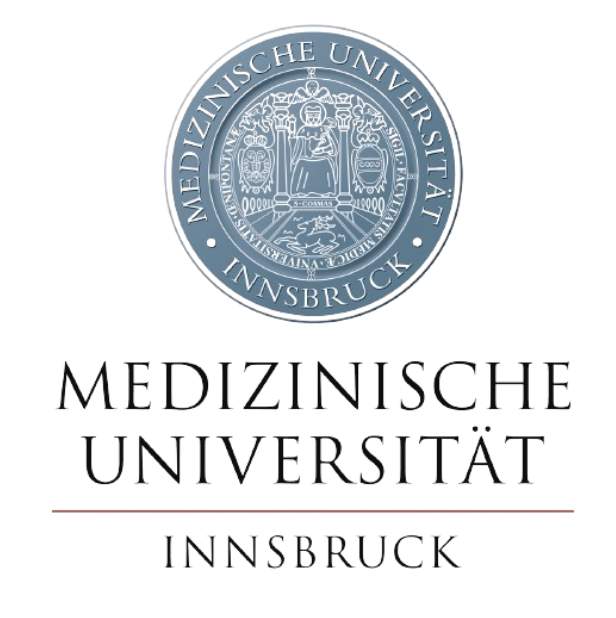
This project fulfils version 1.1 of the quality criteria for citizen science projects on Österreich forscht.
Erlebnis Archäologie
Erlebnis Archäologie is an Austrian association that offers people interested in archaeology the opportunity to take part in archaeological excavations in the form of courses in Austria and abroad without red tape. The association's own research projects are largely financed by course fees.
The aim of Erlebnis Archäologie's excavation courses is not just to get involved in excavations, but rather to provide a comprehensive insight into a research discipline that is very often only treated superficially and frequently misrepresented in the media. Excursions to the area surrounding the respective research project are an important part of the Experience Archaeology programme in order to familiarise participants with the high density of archaeological sites and to show them where our cultural heritage is literally buried in the ground, what threatens it and how we deal with it.
Of course, the focus is on excavation. The Experience Archaeology courses are designed to offer an uncomplicated introduction to active participation in field research. This provides the opportunity to learn about the work of archaeologists - away from the excavation work itself.
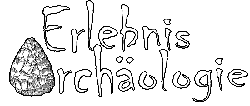
Bug us with your ticks!
For our national tick monitoring programme, we invite you to provide us with ticks. Your samples will help us analyse which tick species appear when and where in Austria. Moreover, ticks will also be investigated for the presence of pathogens.
What are the aims of the project?
The goal of our national tick monitoring programme is to obtain data regarding tick species in Austria, their occurrence, and the pathogens they may carry. The objective is to sample ticks from a wide variety of regions, regardless of whether they are sourced from vegetation or hosts. The collection of ticks is mainly conducted by citizen scientists, whose participation is essential for the success of such an initiative. The collected data can assist in identifying hot spots for specific pathogens, discover new or lesser-known microorganisms, and learn about the occurrence of native tick species but also the spread of invasive ones such as Hyalomma. A continuous monitoring is of importance particularly in light of climate change which can strongly impact the tick fauna. The insights gained from this programme can enhance overall health by facilitating earlier detection of tick-borne diseases and thereby allowing for timely and appropriate treatment.
How can you participate in research?
As soon as you encounter a tick you can join the project if following pre-requisites are fulfilled:
- Tick still intact (i.e. not squeezed out or badly damaged)
- Data available for:
- Date of tick discovery or removal from host
- Postal code and location
- Host information (if tick was removed from a host – which one?)
Ticks have to be securely packaged (e.g. by adhesive tape on a piece of paper inside a properly closed envelope) before being either dropped off at an AGES location or being sent to Vienna:
AGES GmbH
Department for Vector-borne diseases - Ticks
Währinger Straße 25a
1090 Vienna
We would like to point out that the legal regulations for the transportation of dangerous goods by mail must be observed. Live ticks can only be dropped off at the listed drop-off locations.
Further details can be found on our homepage in the section “Found a tick?”. If you suspect to have found a Hyalomma tick (“giant tick”) without the possibility to submit the tick to us please send a photo to This email address is being protected from spambots. You need JavaScript enabled to view it. Thank you!
Background informationen
So far 19 native tick species have been described in Austria. The most common ones belong to the genera Ixodes (e.g. I. ricinus), Dermacentor (e.g. D. reticulatus) and Haemaphysalis (e.g. Ha. concinna). These hard ticks have a lifecycle which comprises of three life stages (larva, nymph, adult). Between each life stage, and before a female adult tick can lay eggs, a blood meal must take place.
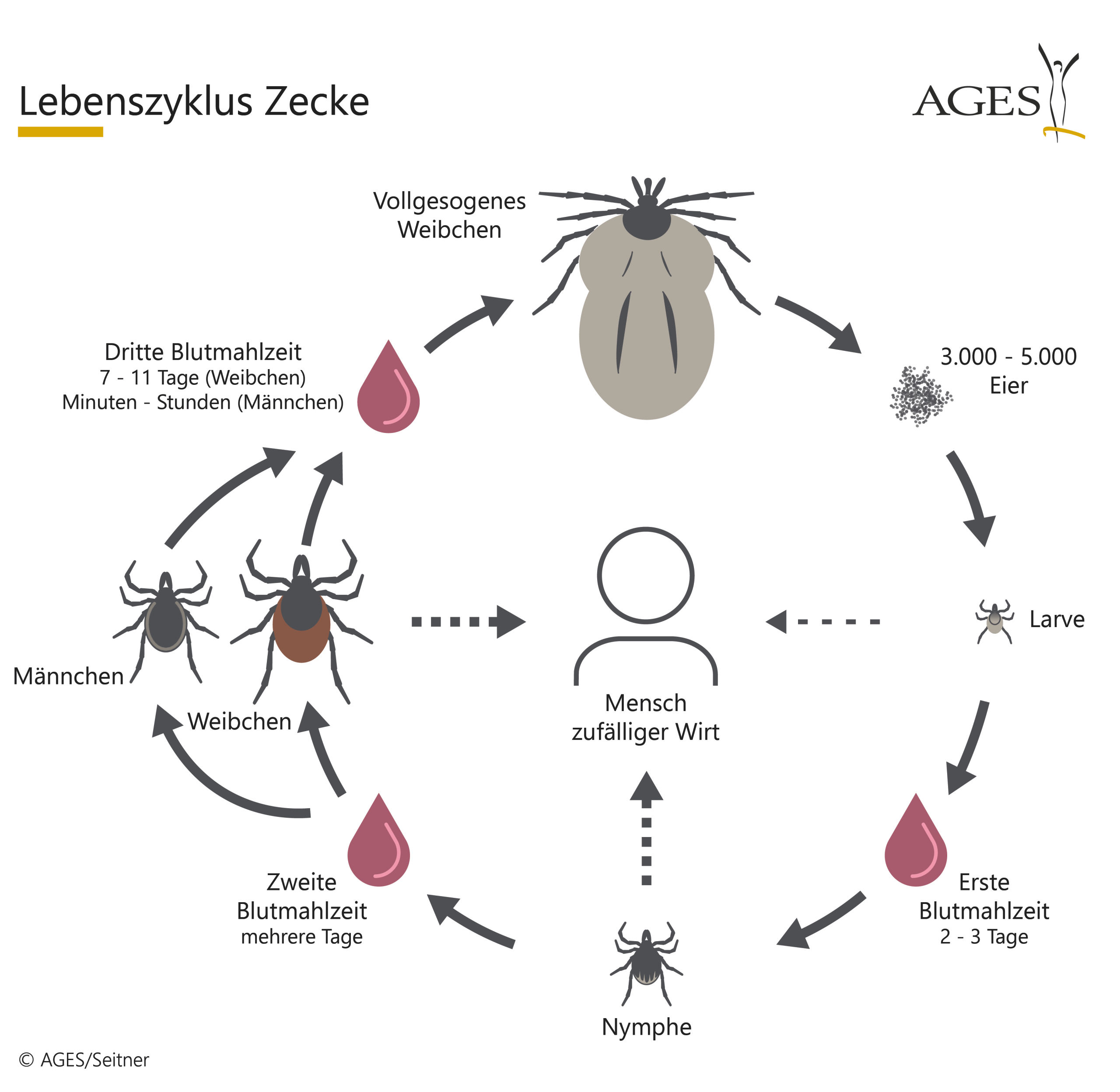
Most pathogens are taken up from reservoir animals during those blood meals (e.g. small rodents, birds, etc.) and can be transmitted from the tick at the next blood meal. The most common pathogen found in ticks in Europe are bacteria of the genus Borrelia which are the causative agent of Lyme borreliosis. However, there are many other tick-borne pathogens which can cause diseases in humans and animals (e.g. Rickettsia, Anaplasma, Neoehrlichia, etc.).
Aside from native ticks the so-called ‘giant ticks’ are increasingly appearing in the media.
They are identifiable by their typical yellow stripes along their legs when compared to native ticks. These ticks are usually imported to Austria from warmer regions. Due to climate change an expansion into more northern regions can be expected. Hyalomma ticks can transmit more harmful pathogens (such as Crimean-Congo haemorrhagic fever virus or Rickettsia aeschlimannii) hence, monitoring the spread of this vector is of medical importance. However, this is only possible by reports from well informed citizens. Thanks to citizen scientists we were able to uncover a previously unrecognized way of migration for these ticks: rather than migratory birds, it was tourists who were responsible for a significant number of introductions of Hyalomma ticks to Austria.
To be able to monitor the tick fauna of Austria for health relevant changes (i.e. expansion of dangerous vectors, emergence and spread of (new) pathogens) a national tick surveillance programme was started beginning of 2024 as part of an EU-project (OH SURVector, EU-Project Nr. 101132974). The acquisition of another project allows for continuation of the implemented surveillance activities until end of 2028.
The mission of AGES is to supply citizens with information. For that reason, a homepage is available which features interesting content about ticks and tick-borne diseases. Moreover, detail information about the ongoing surveillance study and its results are provided.
Role descriptions
Within this project four main tasks are executed:
- Tick collecting
- This step is planned to be carried out by citizen scientists. Participation is open to anyone who finds a tick and sends it to AGES where further processing will take place. It is crucial that submitted ticks are intact and the necessary information regarding date, location and hosts is provided.
- Morphological tick identification
- Tick experts will analyse morphological features of the tick under a microscope to determine the tick species. During that, samples are entered into an internal database, and it is decided whether a tick sample is eligible for further analysis. Strongly damaged ticks will not be processed further than this step.
- Molecular screening for pathogens
- In the next step trained laboratory personnel will extract the nucleic acids (RNA and DNA) of the tick sample and perform molecular methods (e.g. PCR) for detection of tick-borne pathogens. The results are then entered into the internal database.
- Results and communication
- The results of the molecular screening and morphological analysis are summarized. A team of tick experts, data experts and communication experts work together in this step to create maps, submit data to international databases, update the homepage or prepare newsletters. Occasionally information may be disclosed to the media.
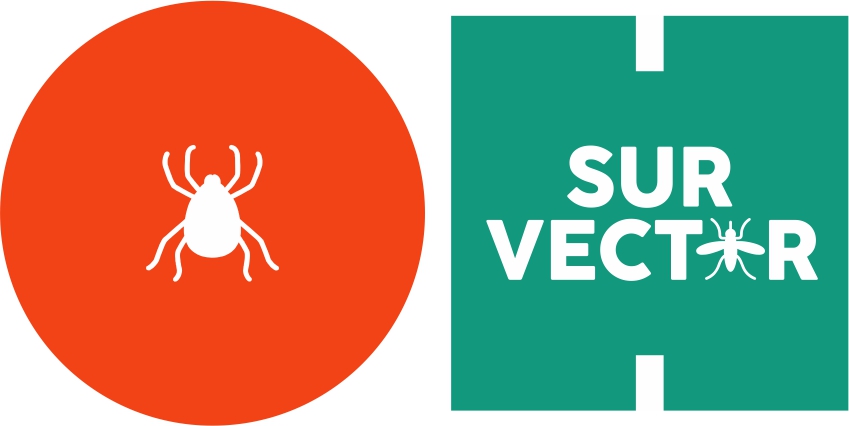

This project fulfils version 1.1 of the quality criteria for citizen science projects on Österreich forscht.
Village
How to raise the village to raise the child
The Village Project supports children and adolescents of parents with mental health issues by strengthening their formal and informal support networks. The aim is to evaluate the effectiveness of the Village approach and integrate it sustainably into existing structures.
What are the aims of the project?
The "Village" project aims to improve support for children of parents with mental health issues in Tyrol. It investigates how affected families can be better supported by developing and testing tailored intervention programs. The project focuses on collaborating with local stakeholders and involving the families directly. Together, solutions are created that address the specific needs of the region. By engaging families and professionals, a sustainable support network is built, ultimately improving the quality of life for both children and their parents in the long term.
How can you participate in research?
Interested citizens could participate in the "Village" project by contributing as local stakeholders or people with lived experience. They took part in workshops where solutions were co-created and shared their experiences to help shape the interventions. They also participated in interviews and surveys that contributed to evaluating the effectiveness of the developed programs. Their perspectives and needs were essential in the research process to ensure that the support measures developed were well-suited to the realities of affected families.
Video about the project
This project fulfils version 1.1 of the quality criteria for citizen science projects on Österreich forscht.
SoilRise
Monitoring of Soilbiota by Citizen Science
SoilRise is a research project on earthworm biodiversity in Europe. Earthworms play a crucial role in soil fertility and are considered important ecosystem engineers. With your help we like to collect data on the distribution and diversity of earthworms in Europe.
But SoilRise is more than scientific research. We aim to build an interactive network between researches, citizen scientists (you) and stakeholders to raise awareness of the importance of soil biodiversity. We seek to explore, protect and conserve the diverse habitats beneath our feet. By taking part in SoilRise, you will be actively contributing to the preservation of our soils and a positive impact on the environment.
Aims
The SoilRise project aims to improve the availability of data on earthworm populations and raise awareness of the biodiversity found in our soils. We aim to identify threatened or non-native earthworm species and compare traditional identification methods with DNA analysis. We will also look at species diversity in different countries to understand the ecological variation that exists.
What do we offer?
- Education and training: SoilRise offer training courses that teach the basics of soil ecology and sampling. There are also workshops that provide in-depth knowledge about earthworms.
- Engagement and impact: Your participation supports our scientific research project and makes a direct contribution to environmental protection. By sampling at different sites you will increase your knowledge of soil biodiversity.
- Community and networking: Become part of the SoilRise network, sharing ideas and networking with other participants and experts.
- Sampling and effort: Your participation is flexible, you can start, stop and continue as you wish between October 2024 and 2026. The effort per site is about 5h.
- Meet and greet: Discover the soil beneath your feet, meet interesting people and experience nature from a new perspective.
Sampling
Sample your field with a spade during the months of March to May and/or September to November. Sampling takes approximately 5 hours and you can record your data on the form provided or on our website. Our team will help you every step of the way, on site if possible.
We will provide all necessary documents such as sampling instruction and data sheets. Our seminars and webinars will to help you to prepare for sampling and you will learn more about the world of earthworms.
At our networking sessions, we will invite you to share your experiences with other participants and the research team.
Who could participate?
Anyone over the age of 14 can take part in the project and search for earthworms (farmers, gardeners, agricultural schools and everyone who is interested).
We have three categories:
- field (arable fields including large scale vegetable production, viticulture),
- small vegetable beds and flower beds (home garden, community garden, town garden, market gardening)
- lawn/meadow, grassland and green spaces (lawns, natural meadows, agricultural grassland)
It is also possible to take part in the project without having a own plot of land.
Register directly at our project website.
SoilRise is a biodiversa+ project in cooperation with Germany, France, Ireland, Poland and Austria.
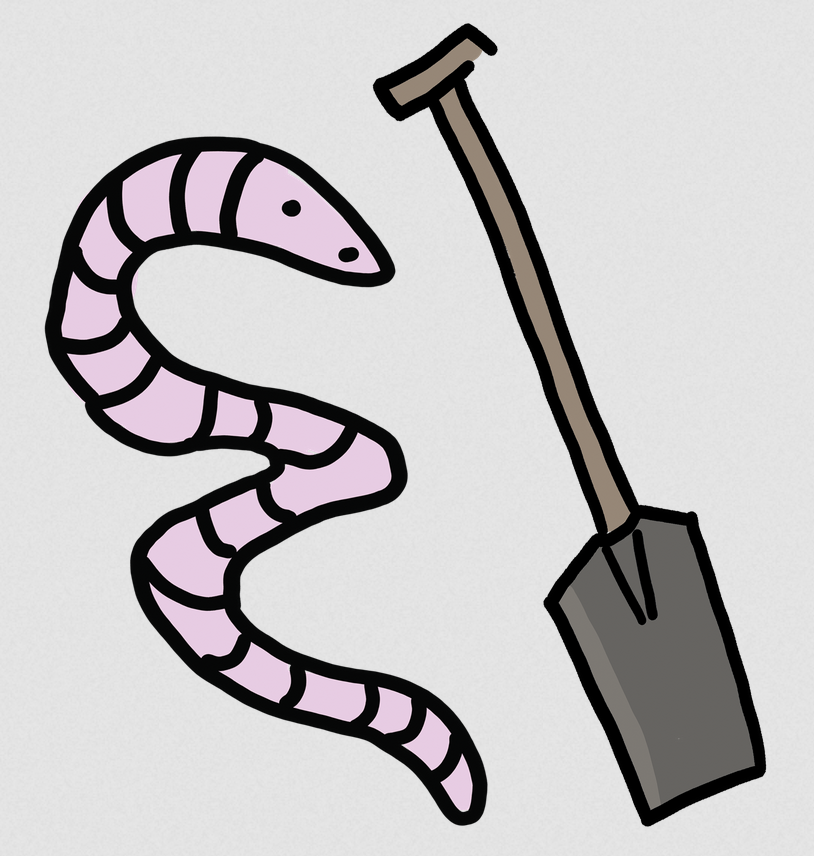
This project fulfils version 1.1 of the quality criteria for citizen science projects on Österreich forscht.

